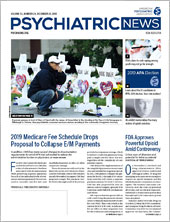APA joined four other physician organizations last month to urge the Trump administration to rescind its new final rules to restrict women’s access to birth control.
The organizations spoke out after the Trump administration issued a pair of final federal rules the day after the midterm elections that allow many more employers to deny coverage for FDA-approved birth control coverage on religious or moral grounds.
“By undercutting women’s access to contraception, a key preventive service, at no out-of-pocket cost in private insurance plans, the final rules conflict with our firmly held belief that no woman should lose the coverage she has today,” the frontline physicians said.
A federal court issued an injunction halting similar interim rules the administration issued one year ago awaiting the outcome of litigation.
The administration also proposed a new rule that same day that would add substantial payment burdens for individual health plans that cover abortion, making it nearly impossible for such plans to continue to cover abortion care. The rule would effectively end abortion coverage for nearly 1.3 million consumers who buy health insurance under the marketplace created by the Affordable Care Act.
“This is a tragic decision. It hurts women and families. Women want to be able to have babies when they can take care of them,” said Nada Stotland, M.D., M.P.H., former APA president and an expert on reproductive psychiatry. “We know that when women’s access to contraceptive coverage is curtailed, the birth rate goes up and the abortion rate goes up.”
Final Rules Allow Opt-Outs for Contraceptive Coverage
The Obama administration deemed FDA-approved methods of birth control an essential health benefit under the Affordable Care Act, requiring most employers’ health plans to provide coverage for them with no out-of-pocket cost. Later, houses of worship were completely exempt from providing this benefit to employees. Nonprofits with religious affiliations and “closely held” for-profit companies could choose an “accommodation” whereby they did not pay for contraception directly, but their health plans were still required to provide it for covered employees for no copay.
The Trump administration’s new rule on religious objections significantly expands the range of employers that can claim religious exemptions, looping in more nonprofit and for-profit employers, including publicly traded companies and private higher educational institutions that issue student health plans. Employers with religious exemptions—and their health plans—are no longer required to provide contraceptive care to females and dependents.
The rule covering moral objections also permits employers to terminate coverage for birth control, but it does not allow publicly traded companies or government entities to claim the moral exemption.
“This interferes in the personal health care decisions of our patients and inappropriately inserts a patient’s employer into the patient-physician relationship,” the frontline physicians cautioned. Additionally, the rules also “open the door to moral exemptions for other essential physician-recommended preventive services, such as immunizations.”
Joining APA in the frontline physician group were the American Academy of Family Physicians, the American Academy of Pediatrics, the American College of Obstetricians and Gynecologists, and the American College of Physicians.
The final rules are set to take effect mid-January, but they are likely to face legal challenges. When the Trump administration issued interim versions of the rules last year, they triggered lawsuits waged by nonprofit advocacy groups and a number of state attorneys general, which are now awaiting appeals. In the cases led by California and Pennsylvania, the federal courts issued preliminary injunctions one year ago, blocking the enforcement of the interim regulations pending the outcome of the litigation.
The frontline physicians also warned of the harmful effects of reducing women’s access to contraceptives on public health. “We know that when women have unintended pregnancies, they are more likely to delay prenatal care, resulting in a greater risk of complications during and following pregnancy for both the woman and her child. The final rules reject these facts and the corresponding recommendations of the medical community, jeopardizing many women’s ability to maintain a vital component of their health care,” they said.
Restrictions on Abortion
The rules come as conservative lawmakers are seeking to restrict women’s access to reproductive health care. At least six states have just one abortion clinic remaining, due to passage of laws restricting abortion clinics, according to the American Civil Liberties Union. The U.S. abortion rate is down 26 percent in the past decade, the lowest level since the Centers for Disease Control and Prevention began monitoring it.
“There has been a concerted effort to roll back abortion rights,” Stotland said, “and not as concerted an effort to preserve them. Abortion is frowned upon and stigmatized, and since the 1973 Roe v. Wade ruling, many women take it for granted. … It’s up to all of us to make sure all women have access to that vital care so we’re not back to coat hangers and women having babies they can’t take care of.” ■
The frontline physicians’ statement can be accessed
here.
